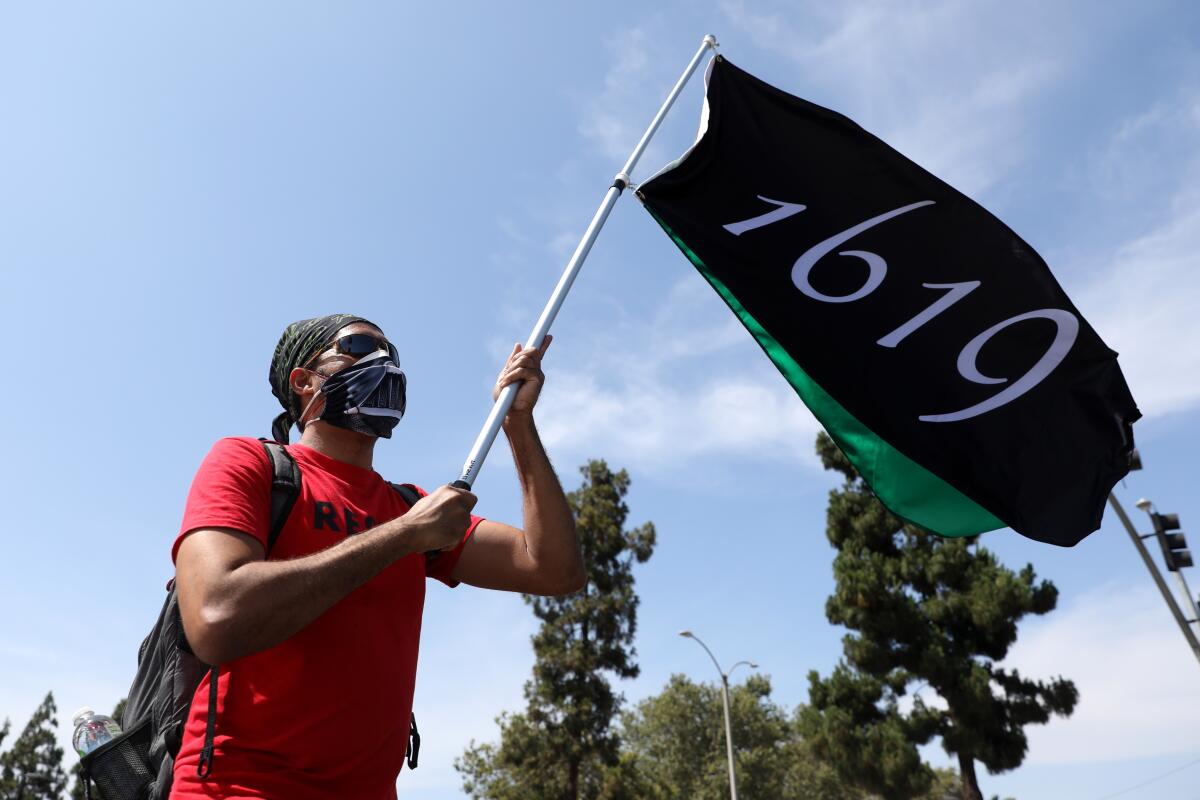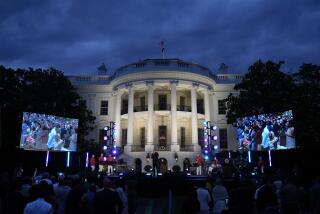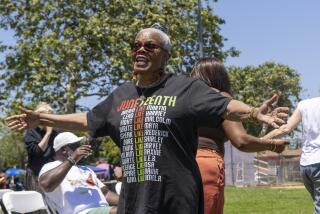Why many Americans refuse to talk honestly about Juneteenth

- Share via
“I’ve heard a lot of different things that haven’t been taught in school like Juneteenth. I don’t know why these things weren’t taught .…” — Clayton Kershaw, June 2020
I hope he does now.
But if not, the greatest pitcher of his generation need only look at what’s going on in his home state of Texas for answers.
Gov. Greg Abbott is expected to sign House Bill 3979, a piece of legislation in the Lone Star State that mirrors other Republican-led efforts across the country to limit (if not flat-out ban) discussions of systemic racism in the classroom — which, of course, is the epitome of systemic racism.
Remember a year ago, when the country was all about Juneteenth? There were television commercials and proclamations about trying to understand each other better as an uncomfortably high number of white people like Kershaw questioned why they hadn’t heard of Juneteenth before George Floyd’s murder.
On Tuesday, the Senate unanimously approved a bill making Juneteenth a federal holiday. That’s good news. But it won’t stop the political attacks on critical race theory, which began back in the 1970s. The GOP needed a new boogey man, so here we are.
While the current debate is about K-12 schooling, the approach grew out of legal philosophy as a way of analyzing how legislation and policies sustain racial inequality. Contrary to its opponents’ rhetoric, critical race theory is not a retelling of American history, it’s a much-needed excavation designed to unearth the impact of events like Juneteenth, which marks the day 250,000 enslaved people in Texas were freed on June 19, 1865. The intent is to connect the dots between yesteryear’s policies and their effects on the racial socioeconomic gap that has haunted the country for centuries.
The fact that Texas, where Black people were still enslaved two years after the Emancipation Proclamation, looks to limit classroom study of this kind of information is so on brand for a place that celebrates the Rev. Martin Luther King’s birthday and Confederate Heroes Day in the same week.
Mississippi and Alabama, not to be outdone, actually honor King and Robert E. Lee, the Confederate general, on the same day — which must make drawing parade routes very difficult.
Did you know a resolution offering an apology for the killing of Emmett Till — the 14-year-old Black boy who was murdered in 1955 and whose killers admitted to the crime after an all-white jury acquitted them — couldn’t even get out of a Mississippi legislative committee earlier this year?
In Alabama, a state representative who wrote a bill banning critical race theory in public education compared it to the indoctrination done in North Korea.
“It’s simply a bill that says in public education, you can’t teach or indoctrinate our children with critical race theory,” state Rep. Chris Pringle (R-Mobile) said about the legislation he recently introduced. “People are waking up all around the nation to how bad this stuff is. I mean, this is woke cancel culture gone completely amok.”
Last year, Pringle introduced an anti-trans bill, so clearly he likes to keep up with the latest trends.
Unfortunately, this assault on history is not a recent trend but an essential aspect of the country’s exceptionalism narrative — a reimagining of events that taught children that Columbus “discovered” a country already filled with people. We’re witnessing this attempt at rewriting history now as some Republicans in Congress try to recast the Jan. 6 domestic terrorist attack as a “normal tourist visit.”
This whitewashing is exactly how destructive race riots led by white supremacists were kept out of the history books. How discussions about the Federal Aid Highway Act of 1956 being used to direct highways through Black and brown communities in cities such as Detroit and Los Angeles were discouraged.
Yes, the GOP’s foray into the critical race theory debate is relatively new, but rewriting American history is not.
One of the reasons lawmakers in Texas supposedly wrote HB 3979 was to ban lessons that would make students “feel discomfort, guilt, anguish, or any other form of psychological distress on account of his or her race or sex.” For the mental health of students.
I swear, if gaslighting were an Olympic sport, Texas would be Simone Biles. For the record, Florida would be Michael Phelps.
Last year, Florida Gov. Ron DeSantis issued a Juneteenth Day proclamation celebrating the end of slavery. This year he successfully pushed for a state education rule that bans lessons that would “denigrate the Founding Fathers” — you know, the guys who made slavery the law of the land.
How does that work?
This movement’s systematic attack on intellectualism has nothing to do with protecting children and everything to do with protecting parents and grandparents from conversations they don’t want to have with their children.
In 1973, as Illinois became the first state to make King’s birthday a holiday, Texas came up with Confederate Heroes Day.
Critical race theory asks what kind of worldview seeks to honor treasonous slave owners as a response to the civil rights movement and what kinds of laws does that engender?
I can see why some folks wouldn’t want to have these conversations in the classroom. Eventually the question of what kind of lawmaker would do this — and whom did you vote for — arises. Some grandparents may not want to tell their grandchildren this inescapable truth: Jim Crow laws didn’t enforce themselves.
Look, I get it — we’ve all seen the footage of water hoses being turned on peaceful protesters and nary an interview with someone who actually held the hose.
Many want to forget about it.
Hide it deep underground, underneath strongly worded proclamations about Juneteenth and talk of racial reconciliation.
But just because something is buried doesn’t mean it’s dead.
@LZGranderson
More to Read
A cure for the common opinion
Get thought-provoking perspectives with our weekly newsletter.
You may occasionally receive promotional content from the Los Angeles Times.










